
The Horatio Alger Association, founded in 1947, began as an example to the rest of America that in this great nation anyone dedicated to a dream and hard work could achieve the summit of success. Using the name of the 19th century author who wrote more than 100 fictional rags-to-riches tales, the founders of the Horatio Alger Association knew what many Americans at the time had forgotten-that opportunities in this great nation did and would forever abound because of our unique freedoms. Each of us has the freedom to dream as well as the freedom to work and persevere until our dreams become reality.
That is what our 10 honorees for the year 2000 represent. While each story is unique to his or her own experiences, they all have one thing in common: a belief in themselves and their abilities as well as a belief in a nation that gave them the freedom to pursue a dream. The following inductees of the Horatio Alger Association represent inner strength, drive, determination, and a positive belief in their abilities to succeed through hard work and perseverance. We are proud to present the outstanding Members of the Class of 2000.
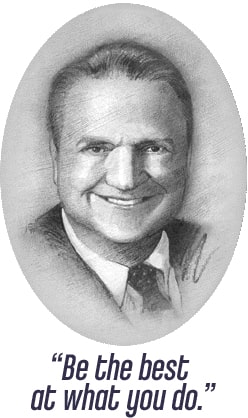 THOMAS C. CUNDY
THOMAS C. CUNDY
Chairman and CEO
CUNDY Inc.
While he was born during the height of the Depression in Pittsburgh, Pennsylvania, Tom Cundy grew up in Bellevue, Kentucky, an Irish/German settlement along the Ohio River. He did not have a close relationship with his father, an unskilled laborer and an alcoholic who was away from home for long periods of time. When he was 16, his parents were officially divorced.
Cundy's mother, Nettie Mae Maloney, was a bright straight-A student who never had the opportunity to finish high school. She earned a small income for herself and her son by working in a Cincinnati department store. "I lived with my mother in a very small house, where I slept on a cot that I made up each night," says Cundy. "I never had a real bed until I went away to college."
Besides his mother, Cundy had the love and support of his maternal grandparents. His grandfather, a factory worker, loved to read and spent many hours talking with his young grandson.
2000 AWARD WINNER
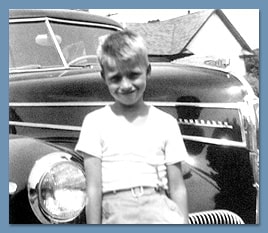 Tom Cundy, age 8.
Tom Cundy, age 8.Although he had no formal education, he was very bright and played a large role in molding Cundy's foundation. Cundy described his grandmother as the "love of my life. She had a great love for her family and never said an unkind word about anyone. I always felt that I could never fail with someone like her in my corner."
Cundy's introduction to selling began at an early age. In the second grade he sold Liberty magazines door-to-door. "I was a good salesman," he says, "which came in handy later in life. I had no call reluctance and never took rejection personally." His determination to succeed was evident even at that young age. To make more money, he usually held two jobs, doing such things as delivering newspapers, cutting grass, running errands, and shoveling coal. "I did all I could to make even a quarter," he recalls.
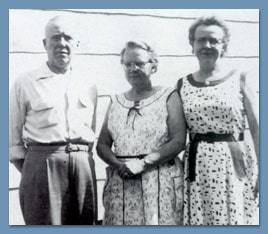 (l to r) Tom Cundy's grandfather; John Patrick; his grandmother; Lou Emma Maloney; and his mother; Nettie Mae Maloney.
(l to r) Tom Cundy's grandfather; John Patrick; his grandmother; Lou Emma Maloney; and his mother; Nettie Mae Maloney."At the end of each day, my mother and I pooled our earnings." Even though Cundy and his mother lacked monetary assets, they were rich in such character traits as discipline, honesty, and perseverance. He had a deep love and respect for his mother who could be intense and demanding, but who also worked hard to help her son in every way possible.
During the Depression, Bellevue, Kentucky, benefited from the WPA construction of a sports complex consisting of a stadium, tennis and basketball courts, and fields for football, track, and baseball. Cundy remembers every kid in Bellevue hanging out at that stadium. It was there that his love of sports was fostered. He began playing tennis when he was 10, and a friend of his mother's, Roger Klein, tutored him in the game. "Coach Klein was also the high school driver education teacher and all the students loved him," says Cundy. "He was funny and a good listener, and he became my mentor.
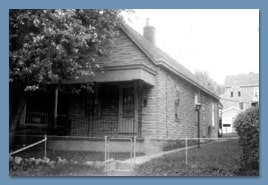 Tom Cundy's childhood home in Bellevue, Kentucky.
Tom Cundy's childhood home in Bellevue, Kentucky.He had a love of God and his church, and I would attend with him every Sunday. At night, I would visit with him while he strung rackets in his basement. There we talked about tennis strategy and he would relate stories about the University of Kentucky where he had played."
Tennis quickly became the focus of Cundy's life. When he entered ninth grade, he became the caretaker of the Bellevue tennis courts. "I made $2 a week working four hours each morning brushing, scraping, hosing down the courts, and then lining them. Even though it was a long process, I would have done it for free because of my love of tennis and Coach Klein. I considered the job an honor."
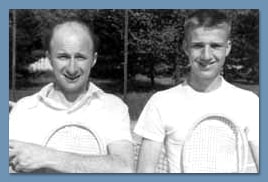 Tom Cundy (right) with boyhood tennis coach, Roger Klein.
Tom Cundy (right) with boyhood tennis coach, Roger Klein.Tom Cundy became an excellent tennis player, winning the first tournament he entered. He won against many players who represented local country clubs. "We would go to tennis tournaments without a dime in our pockets," says Cundy. "We couldn't even buy a lemonade or a sandwich, but I found that motivational. Coach Klein once asked me to write down three important things I wanted to accomplish in life. My goals were: 1 .Win the state high school tennis tournament and obtain a scholarship to a good university; 2. achieve business success; and 3. be a millionaire."
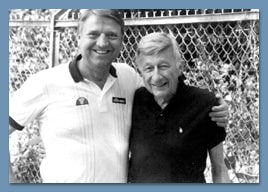 A recent meeting with Cundy and Coach Klein.
A recent meeting with Cundy and Coach Klein.Coach Klein's best friend, Joe O'Brien, also had a profound influence on Cundy. "He was a world class tennis player. I played doubles with him all summer, it was a great opportunity for me to grow and improve. But it was his attitude about life that made the biggest impact on me. Although Joe only had one arm, he never viewed that as a handicap. He taught me that we should always live up to our full potential doing the best with what we have. I have a great amount of love and respect for him."
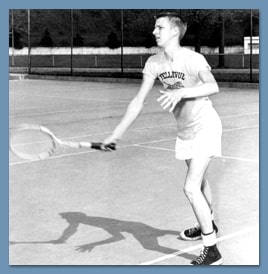 Tom Cundy won the 1951 Kentucky state tennis championship, which earned him a scholarship to Florida State University.
Tom Cundy won the 1951 Kentucky state tennis championship, which earned him a scholarship to Florida State University.Cundy accomplished his first goal in 1951 by winning the Kentucky state high school tennis championship. This win brought him scholarship offers from many Big Ten schools as well as the Naval Academy, but he chose Florida State University.
To supplement his scholarship, he worked as a busboy in the school cafeteria and washed dishes in the fraternity house. During summers he worked for a bottling company in Cincinnati and as an assistant to Coach Klein. He was a top player on the FSU varsity tennis team his entire four years and traveled extensively to major tennis tournaments. Cundy led the Seminoles to their best season ever in 1953 with a 15-2 record, which still stands.
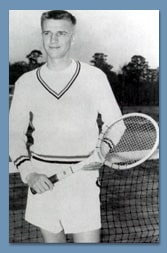 At Florida State, Cundy was seeded the number one player on the varsity tennis team for four years.
At Florida State, Cundy was seeded the number one player on the varsity tennis team for four years.Following his 1955 graduation with a degree in industrial psychology, Cundy was commissioned as a lieutenant in the Marine Corps. He served as tennis coach at the Quantico, Virginia, Marine base and led his team through a 42-match undefeated schedule. Apart from athletics, Cundy took his service in the Marines seriously. "I feel being an officer in the Marine Corps was the greatest accomplishment in my life," he says. "I learned how to conduct myself personally; how to solve problems face-to-face; how to be disciplined; and how to have honor, pride, and respect for my parents, friends, and country." Cundy left the Marine Corps as first lieutenant and obtained the rank of captain while serving in the reserves.
At FSU Cundy enjoyed sales and marketing courses and after he left the Marines he decided to try his hand at selling insurance. When he applied for a position at Aetna, he was asked to take an aptitude test. "I failed it," he recalls. "The first question asked was: List all the words you can think of which begin with A and end with H. I couldn't think of one. I told the examiner I had a headache and I left." Still, that experience left him undaunted. He landed a sales job with Prudential and within 10 months sold more than $1 million of insurance. Fortified with a great deal of self-confidence, he left Prudential to start his own agency backed by Provident Life & Accident. "It wasn't easy to get established," he says.
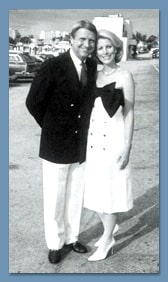 Tom and Janie Cundy have one daughter, three sons, and six grandchildren.
Tom and Janie Cundy have one daughter, three sons, and six grandchildren."I knocked on doors all over south Florida, many of which were slammed in my face. But I smiled, said "thank you" and never gave up. I am fortunate that I selected one vocation and stayed with it rather than bouncing around from job to job." His persistence made him very good at what he does. Over the past 40 years, Cundy has attained record success with many notable clients and with this he achieved his second life goal.
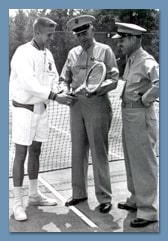 Lt. Tom Cundy was the Marine Corps tennis champion at Quantico, Virginia in 1956.
Lt. Tom Cundy was the Marine Corps tennis champion at Quantico, Virginia in 1956.Looking back over his life, Cundy says his early adversities were certainly a blessing. "When I was growing up, I wasn't proud of our financial circumstances," he says. "I was often thrust into a country club setting and was ashamed to let those friends see where I lived. I had a chip on my shoulder and I used to think that someday I would show them. It was a driving ambition and that motivated me to get out of bed in the morning. I learned significant things about myself through my adversity. I learned that I have the ability to hang in there when circumstances get tough. I learned that I am hard working and resourceful, and was fortunate to have people who believed in me as I learned to believe in myself."
Cundy wanted to give himself the opportunity to succeed. He started down that road with a good education. "Getting a college degree is the foundation," says Cundy. "It starts you on your way. I couldn't put a price on what my education and the Marine Corps did for me." That is why he is so honored to become a member of the Horatio Alger Association. "This award," he says, "is one of my life's greatest accomplishments. I am proud to belong to an organization that does so much to help deserving youth get their start in life."
Tom Cundy has also learned many of life's lessons from his family, his coach, friends, and clients, including baseball great Joe DiMaggio. Horatio Alger Member Bernie Little (1994) has served as Cundy's mentor for more than 35 years. Also, August Busch III, chairman of the board and president of Anheuser-Busch, and one of Cundy's first major clients, served as one of Cundy's role models. "He is a great leader and tireless worker," says Cundy. "His relationship with his family is remarkable, especially for a man of his prominence and responsibilities. I have tried to do the same, balancing my work with my family life. My wife Janie and I have four children and six grandchildren. All my children are successful and I take enormous pride in all of their accomplishments. I am extremely proud of all of them."
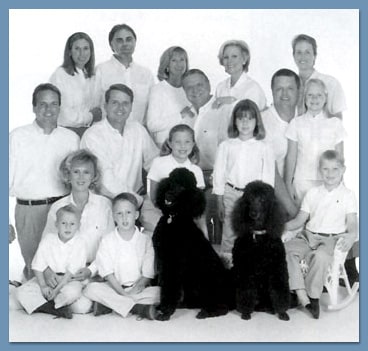
The Tom Cundy family in 1998
TOM CUNDY AND CUNDY
Tom Cundy is proud of the fact that 45 years after starting his insurance business his original clients are still with him. He credits such loyalty to his sincere regard for people. "My love of people has been a tremendous asset," he says. "To make friends you have to be a friend."
Cundy began calling on fraternity brothers and networked his way into becoming a principal consultant of employee benefits for many of America's major corporations, which today include Anheuser-Busch, AutoNation USA, Blockbuster, Eckerd Corporation, Ford, Friendly's, Fruit of the Loom, Perkins Restaurants, Republic Industries, Revlon, Ryder System, Inc., and Viacom. He says, "I credit my success to hard work and a desire to give the very best products and service a client could possibly expect." Nationally known as a "master net-worker," Cundy has a unique style that distinguishes him from others. He has been a member of insurance industry organizations such as the Million Dollar Round Table since 1960 and MDRT's prestigious Top of the Table.
Cundy's motto is: You should strive to be number one. What you do has to meet the test of time. That is what he told himself when he began playing tennis and it has worked for him ever since. "Whatever I have achieved in life is the result of the lessons I learned while playing tennis," he says. "You have to be the best at what you do."
